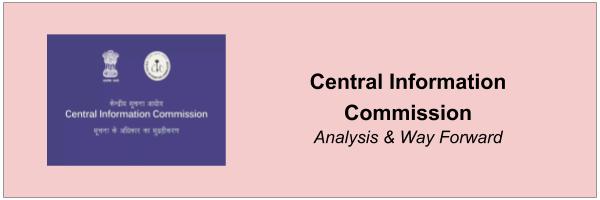(HOT) UPSC Current Affairs 2025 PDF
NEW! The Gist (JAN-2026) | E-BOOKS
Office of Central Information Commission : Important Topics for UPSC Exams

Office of Central Information Commission—An Analysis

About CIC:
The Right to Information Act, 2005 provides for establishment of Central and State information commission as a designated authority to receive and inquire into a complaint from any person.
CIC is responsible for implementing RTI at central level. Its strength is 11 information commissioner (IC) including 1 CIC. All are appointed by the President. The tenure of CIC is 5 years and an MP/MLA can't become a CIC or IC. The person who holds the office of commissioner or IC are of eminence in public life with wide knowledge and experience in law, Science and Technology, social service, management, journalism, mass media or administration and governance.
Challenges-
- The RTI act did not give adequate authority to IC to enforce their decisions. They can only direct authority to award compensation to an applicant, but no authority if such directions are neglected.
- Commission can impose a maximum penalty of 25000 Rupees as a deterrent, but it works only when the institution involve in lower level and in ministerial and upper level, even this deterrent may not apply.
Recent Proposals and associated issues-
- The government proposes to end up with the equivalence of CIC with the Election Commission, despite of fact that both are the inevitable part of democratic protection.
- Government also proposes to replace the 5 years tenure with tenure as may be prescribed by it. This would be detrimental to the independence ad authority of the IC.
- There is also a proposal to not disclosing any personal information if it is not related to any public activity. This may harm the essence of the information as the scope of privacy is too large.
Bigger Questions-
There are certain inherent problems associated with the CIC. Some of them are-
- Although CIC enjoys complete financial and administrative powers of a Department of Government, they have to dependent upon the government for filling posts and therefore, presently, CIC has been functioning with less than their prescribed strength of 11 members.
- It eventually leads to the delay in disposal of the cases, that is compounded by the backlogs in the High Courts, where the number of decisions of the commission are challenged.
- The other big issue is the selection procedure of CIC and other IC. President choses them on the recommendations of the committee that includes-- Prime Minister as chairperson, the leader of opposition in the Lok Sabha, a Union Cabinet minister to be nominated by the PM. All the procedure questions the independence of CIC.
Way forward-
The RTI Act is a gem for a Parliamentary democracy like India. Moreover, it’s a basic human right to get information that affect our life. CIC is an institution that acts like a watchdog in this act. The very purpose of CIC and state information commissions is to have a look whether relevant information are provided to the people.
For that matter there is a need to empower the institution as it has to deal with all the level of officials in various departments. There is a need to enhance the working efficiency of the institution and make CIC an autonomous and independent commission.
Multiple Choice Question-
Q. Which of the following is/are true about Central Information Commission.
1. It was established in 2008.
2. It is an autonomous, but not a constitutional body.
3. President appoint the CIC and other IC are appointed by Chief Justice of India.
a. Only 1 is correct
b. Only 2 is correct
c. Only 1 and 3 are correct
d. All are correct
Answer is : b.
Hint- CIC was established in 2005. All the members are appointed by the honorable President of India.
Mains-
High probability that a direct question might come with CIC in GS 2. The format may be-
Q. The office of Chief Information Commission act as a watchdog under RTI Act, 2005. However, the body is suffering from a lot more issues and government interferences. Critically analyze.
Hint-- Try to describe about the commission in introduction part. Then directly comes to the issues and how it affect the rights of a common citizens. I have not given facts in the Article. Try to search by yourself and garnish your answers by including some of them that you think are relevant. End up with positive way forward.

